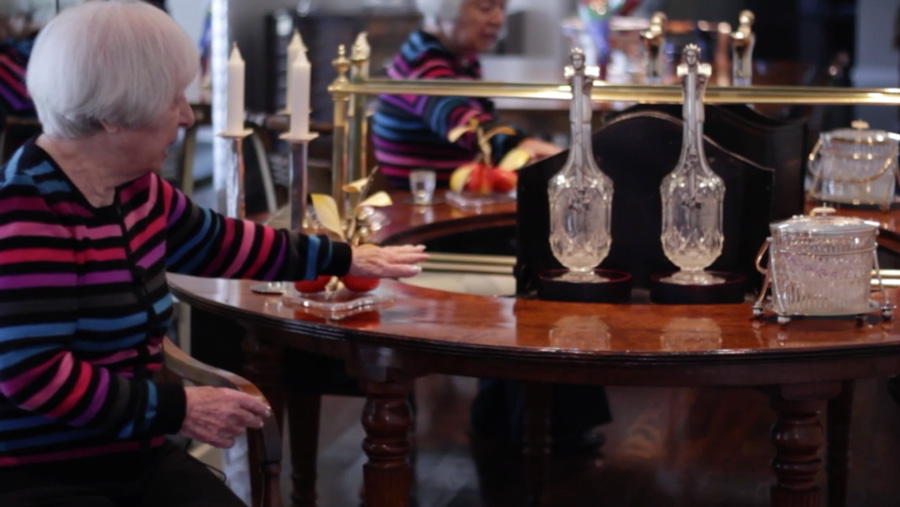In 2011, Jane Fonda took an inspiring stance on aging that resonates with our beliefs at Ezra Productions. In her Ted Talk, entitled Life’s Third Act, Fonda breaks the human life cycle into three distinct periods: ages 0 to 30 (stage 1), 30 to 60 (stage 2), and finally 60 to 90 (stage 3), which she only refers to as the “final act” once in her 11-minute speech. The phrase “the final act” tends to conjure dramatic feelings and morbid images, which is the opposite of what Fonda is trying to get across when she talks about aging. She asserts that the third act of our lives is another active phase of our lives. We have work to do!
She explains that in theatre, the third or final act of a play is a time in which all of the pieces of the story’s puzzle come together, a time in which all of the drama surfaces and then subsides, and a time when the characters reach a state of wholeness. Typically, it is when the arc of the story is winding down.
Fonda posits that in life, the third act is actually a time to bring finality to the things we have left unfinished in our lives–to forgive, to reflect, and to change our relationship to the past. In doing so, we ascend up a metaphorical staircase that leads us closer to our authentic selves, and to our source.
During our third acts, our task is to reflect on the decisions we’ve made in the first and second acts of our lives, and in doing so, we become much wiser and more relaxed. Fonda recommends that men and women in their third acts complete “life reviews” in which people reflect upon their experiences, opinions, and beliefs, which in turn frees them from the past, and even opens them up to becoming what they might have been.
Various psychological studies have found that doing a “life review” can have a profoundly positive impact on older adults, including giving new significance, clarity, and meaning to a person’s life.
As adults in their third act reflect upon their lives, they try to find the meaning and the purpose of their existence.
In reviewing past relationships and events and our behaviors and reactions to them in a non-emotional state, we are able to approach our past with positivity and understanding, which brings wisdom and authenticity, and leads us closer to becoming whole.
Reflecting on our past with positivity can also actually cause a change in the hardwiring of the neural pathways in our brains.
In addition to the aforementioned benefits third-acters gain from completing life reviews, this exercise can also make third-acters a better resource for their family and friends.
Having access to someone who has taken the time to reflect on their lives–from the hardest lessons they have learned to their most cherished experiences–is infinitely valuable to anyone looking for direction.
But why stop with our friends and family? Let’s take this idea one step further. If everyone in the world–ok let’s just start with people who are currently in their third acts (ages 60-90)–took the time to reflect on their past, we could create a cultural shift in the world. A shift away from the fear of aging, and towards those people in our lives and our communities whose experiences are truly invaluable.
Interested in doing your own “life review”? There are a few ways you can go about it. First, choose your format–will you be writing your answers, speaking them (into an audio recorder), or speaking to a camera? Each step brings you closer to the people who will one day cherish your answers. Second, decide whether or not you’d like to have another person involved (more on that later).
Third, develop your questions. Here are some resources:
- http://storycorps.org/record-your-story/question-generator/list/
- http://www.greatlifestories.com/howto.html
- http://dancurtis.ca/2011/01/26/the-50-best-life-story-questions/
It might be tough for some to start with a blank sheet of paper or a computer screen. It’s also very easy to get sidetracked and never finish this type of project even if you have the best of intentions.

This is a frame from a Family Legacy Film we produced for a woman in Beverly Hills. In the video, she documented the antiques she collected over the years and told the stories associated with each item. She passed this video on to her children and grandchildren, and it will stay in their family for generations to come. It was also a helpful for estate planning purposes. View the case study of this Family Legacy Video here.
At Ezra Production, we are proud to offer Family Legacy Videos to people in the third act of their lives. The benefit of hiring a professional production company that specializes in personal histories and life reviews (like Ezra Productions) is that you’ll get it all done in one shot, we won’t let you leave out any important details, and you don’t have to worry about the technical aspects of this undertaking. Most importantly, Ezra Productions is actually interested in where you came from and what experiences have shaped who you are today! We believe that everyone has a story to tell. We can’t wait to hear yours.
Some examples of psychological studies that show that life reviews (a.k.a. “autobiographical retrieval practice”) works:
1. Korte, J., Bohlmeijer, E. T., Cappeliez, P., Smit, F., Westerhof, G. J. (2012). Life review therapy for older adults with moderate depressive symptomatology: A pragmatic randomized controlled trial. Psychological Medicine, 42.6, 1163-1173.
2. Chippendale, Tracy and Bear-Lehman, Jane (2012). Effect of Life Review Writing on Depressive Symptoms in Older Adults: A Randomized Controlled Trial. Am J Occup Ther 2012 66: 438-446.
3. Serrano, Juan Pedro; Latorre, Jose Miguel; Gatz, Margaret; Montanes, Juan. Life Review Therapy Using Autobiographical Retrieval Practice for Older Adults With Depressive Symptomatology. Psychology and Aging, Vol 19(2), Jun 2004, 272-277. doi: 10.1037/0882-7974.19.2.272


